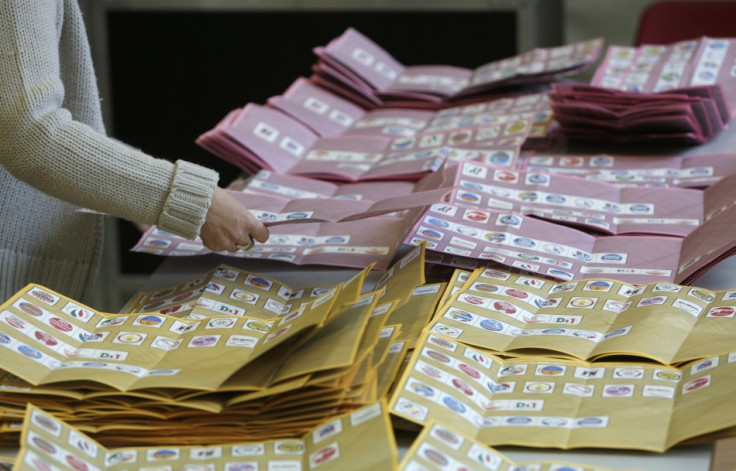Italian Political Gridlock Hammers European Markets [VIDEO]

Italy's political paralysis hit financial markets hard Tuesday with bond yields rising sharply ahead of two key debt sales that will test investor patience amid the spectre of a hung parliament in Europe's third largest economy.
Centre-left coalition leader Pier Luigi Bersani's failure to gain control of both houses of government late Monday have increased concerns that Italians will need to go to the polls again this spring in order to elect a leadership capable of governing a nation clearly divided on how best to tackle its steep economic challenges.
The current political uncertainty, however, will also be a test of investor sentiment for not only Italy's financial markets but also for the broader Eurozone as it attempts to distance itself from last year's sovereign debt crisis.
"The evolution of market sentiment on Italy and consequently on the eurozone will depend crucially on how Italian politicians manage the political crisis and market expectations on Italy's credibility regarding continuing with fiscal consolidation and structural reform," wrote Barclays strategist Fabio Fois.
"The increase in political instability is likely to affect rating agencies' judgement on Italy, as they have highlighted in their statements the Italian economy's need for structural reform, with the political instability as the main implementation risk."
The surprise result, which saw Bersani's commanding lead evaporate in the final fortnight of the emotional campaign, gave his PD coalition a narrow half-point win in the lower house of parliament, known as the Chamber of Deputies. His attempt to win control of the 315-seat Senate, however, was thwarted by recounted votes at the behest of former prime minister Silvio Berlusconi, whose centre-right PDL coalition gained enough support to block Bersani and create the current gridlock.
Beppe Grillo, a former comedian who founded the anti-austerity Five Star political party, gained around 25 percent of the national vote in his very first election.
Italy's main share index, the FTSE MIB, fell more than 5 percent in early trading in Milan as investors pounded bank shares on concerns that their massive holdings of government bonds will weigh on their capital base. The same was true for major bank shares in France, Germany and Spain, where benchmark indices registered triple-digit declines amid the market turmoil. The STOXX 600 Europe Banks index fell 4.36 percent in the opening minutes of trading and was quoted at 170.27 by 0820 GMT. The European Central Bank also owns around €103bn in Italian government debt, nearly half of the €218bn it bought as part of its now-defunct Securities Markets Programme.
In the bond markets, benchmark 10-year Italian government bond yields rose to 4.9 percent Tuesday, a 50 basis point increase from Monday's close and the highest level in at least 14 months. The extra yield, or spread, investors demand to hold Italian debt instead of triple-A rated German bunds widened 58 basis points to 3.41 percent, according to data from the bond trading platform Trade Web.
Credit default swap prices for Italian bonds rose 40 basis points to 285 basis points, according to data provider Markit. This means an investor would need to pay an extra €40,000 each year for five years to insure €10m in bonds from default. It's the biggest single-day increase since December of 2011, Markit analyst Gavan Nolan said.
Italy's Treasury faced a stern test of investor sentiment this morning with an auction of €8.75bn ($11.4bn/£7.5bn) in six-month Treasury bills. The sale drew €12.6bn in total bids but the cost for the Italian taxpayer rose to 1.237 percent from 0.73 percent at a similar sale last month. Today's rate was the highest since October.
On Wednesday it will re-open a previous issue of five-year bonds in an attempt to raise between €1.75bn and €2.5bn, according to its auction schedule, and re-open a previous 10-year issue to raise between €3bn and €4bn.
"This represents an important market test that has the potential to fuel more pressure on the Italian paper, possibly pushing the 10-year yield into the 5 percent to 5.2 percent area over the coming weeks," said Fois. "At this level, we expect a stabilisation of yields: many investors (especially hedge funds) have already opened short positions on the Italian paper and we believe that a 'wait and see' approach is likely to prevail at this stage, with investors trying to figure out the next political developments."
The Treasury has raised around €36bn so far this year, according to Barclays data, about a fifth of its planned €190bn target. It also faces around €137bn in redemptions for the remainder of the year.
© Copyright IBTimes 2025. All rights reserved.




















